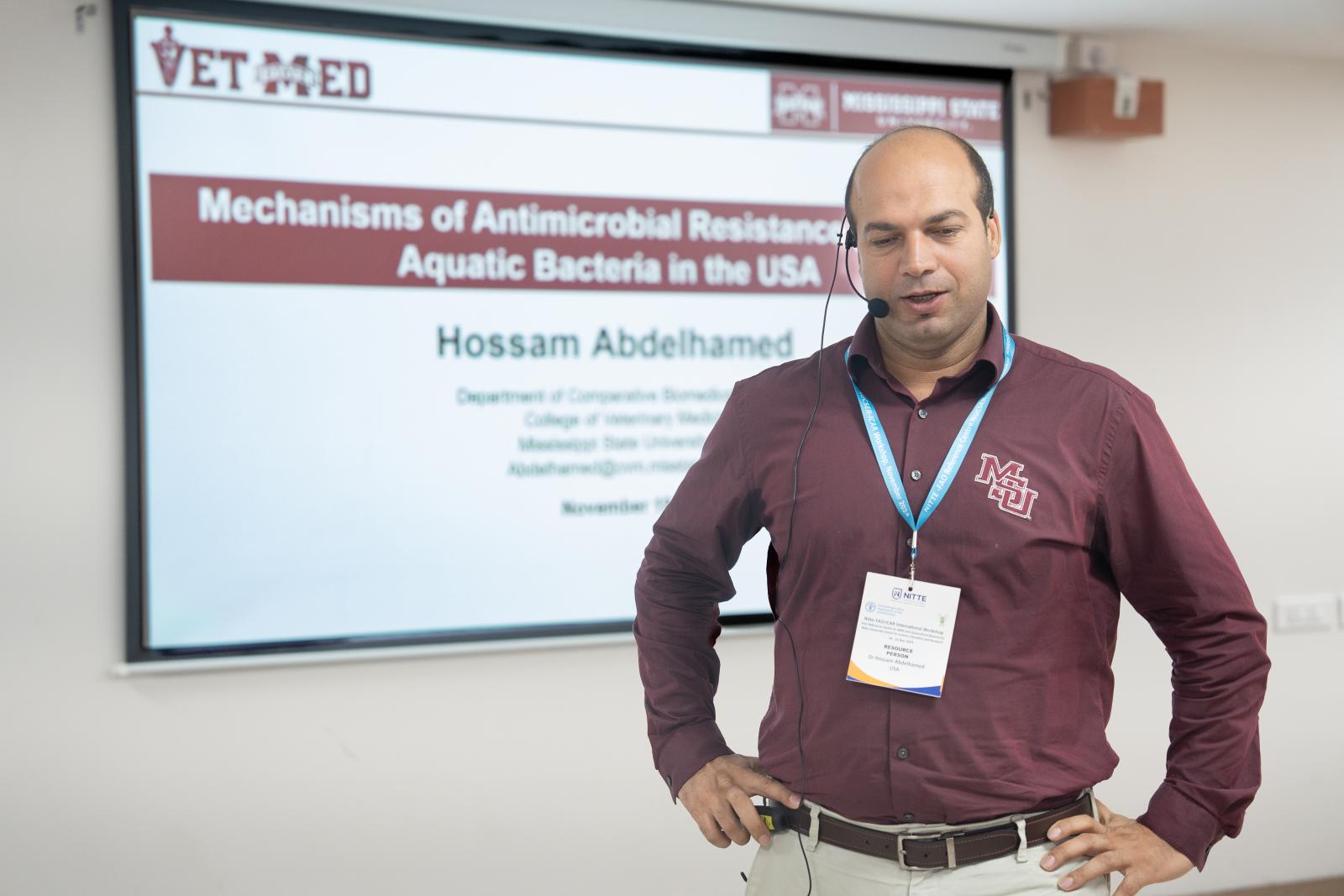
Photo of Hossam Abdelhamed (Photo by Paulo Padre, Graphic Designer for FAO)
By Alaina Dismukes
Antimicrobial resistance is a chief concern in agriculture, affecting production and creating risks to human health and food security. The Feed the Future Innovation Lab for Fish and the Food and Agriculture Organization of the United Nations (FAO) Reference Center on Antimicrobial Resistance and Aquaculture Biosecurity at Mississippi State University, both led by the Global Center for Aquatic Health and Food Security (GCAHFS), were represented at a recent workshop during World Antimicrobial Awareness Week. The network of FAO Reference Centers for Antimicrobial Resistance and Aquaculture Biosecurity hosted the “International Hands-On Training Course on Utilizing Microbiome and Genomic Resources for Understanding and Mitigating Antimicrobial Resistance in the One Health Context” at Nitte University in Mangalore, India.
From November 18–22, the capacity-building workshop in collaboration with Nitte University and the Indian Council of Agricultural Research (ICAR) brought together instructors and attendees, including a College of Veterinary Medicine (CVM) faculty member and Fish Innovation Lab host country co-principal investigator, to exchange knowledge on antimicrobial resistance and aquaculture biosecurity.
Sandip Mitra, from Bangabandhu Sheikh Mujibur Rahman Agricultural University, attended the meeting on behalf of the Fish Innovation Lab activity on carp biosecurity in Bangladesh. Currently, the research team is finalizing a questionnaire for a research survey to interview farmers, hatchery owners, and other value-chain stakeholders with the end goal of establishing cost-effective biosecurity policies and a health management system for the aquaculture sector in Bangladesh.

“The sessions from Melba Reantaso, an FAO representative, and Hossam Abdelhamed, Mississippi State University College of Veterinary Medicine faculty member, provided the basics of antimicrobial resistance and aquaculture biosecurity,” Mitra said. “Additionally, Reantaso agreed to have a few meetings with me to discuss the formulation and implementation of a biosecurity policy in Bangladesh, which will certainly be valuable in developing a national strategy for antimicrobial resistance and aquaculture biodiversity.
“In Bangladesh, antimicrobial resistance in aquaculture and its effect on the economic loss of fish farms have received very limited attention, which may be an interesting part of a future multidisciplinary project. To make our work successful, a strong research team of both biologists and economists is necessary for a One Health approach.”
In MSU’s role as an FAO Reference Center for Antimicrobial Resistance and Aquaculture Biosecurity, GCAHFS and CVM were represented by Abdelhamed, who served as an instructor for the workshop.
“Abdelhamed gave a wonderful session on antimicrobial resistance, and I learned much from him,” Mitra said. “He spoke on genetic mechanisms underlying antimicrobial resistance in aquaculture pathogens. Antimicrobial resistance can cause animal suffering and economic losses by making bacterial diseases difficult to treat, so multidrug-resistant strains are now being sequenced to determine the genetic basis. He emphasized that appropriate antimicrobial use in aquaculture is critical to prevent the selection of antimicrobial-resistant strains.”
“Antimicrobial resistance is a growing concern in aquaculture, and it is essential for us to understand the genetic mechanisms behind it,” Abdelhamed said. “Effective antimicrobial stewardship, alongside biosecurity policies, will be key in mitigating the risks associated with resistant pathogens, safeguarding animal health, and ensuring the sustainability of aquaculture industries.
“Teaching in this workshop has been an invaluable experience, allowing me to meet new people and expand my network. The exchange of ideas with fellow researchers, professionals, and government officials will undoubtedly inform future collaborative efforts and help my research program. It’s clear that strengthening biosecurity measures and promoting responsible antimicrobial use are crucial steps towards ensuring sustainable aquaculture practices and public health.”
To learn more about the FAO Reference Center on Antimicrobial Resistance and Aquaculture Biosecurity, visit www.gcahfs.msstate.edu/projects/fao-reference-center-antimicrobial-resistance-and-aquaculture-biosecurity. More on the Fish Innovation Lab is available at www.fishinnovationlab.msstate.edu.